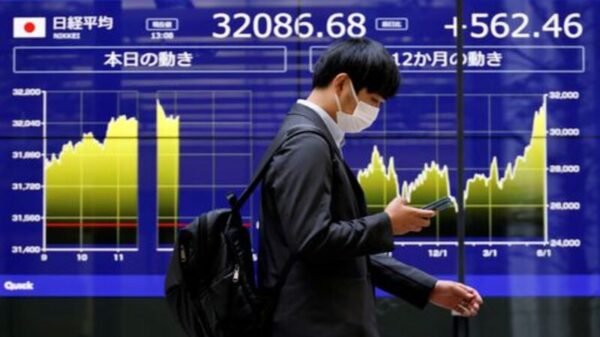Fed pause bets lift Asia shares; China real estate falls. On Friday, Asia-Pacific equities climbed to their highest level since mid-February, following an overnight Wall Street rally as market bets increased that the Federal Reserve will not raise rates next week.
Japanese and Australian bond yields followed U.S. Treasuries lower, while the dollar failed to recover from a two-week trough.
MSCI’s broadest Asia-Pacific share index (.MIAP00000PUS) rose 0.6%, reaching its highest level since Feb. 16.
After falling from a 33-year high in the previous session, Japan’s Nikkei (.N225) rose 2%, driving much of that.
Hong Kong’s Hang Seng (.HSI) rose 0.26%, lagging Chinese markets.
Property shares (.CSI000952) fell 2.3%, dragging down mainland blue chips (.CSI300) to practically flat. Last week, the sector rose 7.3% on expectations of Beijing stimulus, which never came.
Tech-heavy Nasdaq (.NDX) rose 1.27% overnight on Wall Street. S&P 500 (.SPX) gained 0.62%. Asian e-mini U.S. equities futures predicted a 0.1% lower restart for each index.
73% of traders expect the Fed to hold rates on June 14, while 27% expect a quarter-point increase. According to the market, the July 26 decision makes an increase of 80% likely.
Overnight jobless claims data suggested a pause.
Some economists warn against complacency after the Bank of Canada and Reserve Bank of Australia unexpectedly raised rates this week.
“I wouldn’t go all in and say we’re going to get a rate hike, but I think we should be at least 50% priced,” said Tony Sycamore, an analyst with I.G. Markets in Sydney.
“I know people can point to Fed Chair (Jerome) Powell’s comments as being more supportive of a hold than a hike, but there have been some interesting developments since he last spoke,” Sycamore said. “I can’t imagine he’d be happy by the increase in core PCE inflation, nor the robust gain in non-farm payrolls.”
On May 19, Powell said it was uncertain if U.S. interest rates needed to rise further and that the risks of overtightening or under-tightening had become more balanced.
Two-year Treasury rates, highly sensitive to monetary policy expectations, were little changed at around 4.53% in Tokyo after a three-bp decrease in New York. The 10-year yield rose to 3.73% after falling seven bps overnight.
The U.S. dollar index, which measures the currency against six major rivals, gained 0.09% to 103.41, but near Thursday’s low of 103.29, last seen on May 23.
After a one-week low of 138.765, the dollar rose 0.3% to 139.355 yen.
Euro remained unchanged at $1.0777, below Thursday’s two-week high of $1.0787.
The Turkish lira fell to a historic low of 23.54 per dollar, even as President Tayyip Erdogan appointed a U.S. banker as central bank chief, signaling a return to more traditional policy.
Last week, Erdogan reappointed Mehmet Simsek, a respected former finance minister, who declared this week that the economy’s governing principles would be transparency, consistency, accountability, and predictability.
“The market needs to see it to believe it,” said National Australia Bank senior currency analyst Rodrigo Catril. “Investors are choosing to shoot first and ask questions later.”
After Binance, the world’s largest cryptocurrency exchange, suspended dollar deposits and fiat withdrawal channels due to the SEC’s crackdown, bitcoin briefly dropped by 0.83% before recovering to $26,484.
After a rumor that the U.S. and Iran were close to a nuclear deal, crude oil fell on Friday, but denials from both sides kept it off the previous session’s lows.
West Texas Intermediate (WTI) crude fell $3.50 to $69 on Thursday amid optimism for a deal that may increase Iranian output by 1 million barrels daily.
WTI futures closed 58 cents lower than Thursday’s $70.71. Brent crude fell 57 cents to $75.39.






































Comment Template